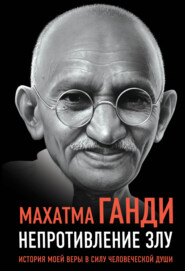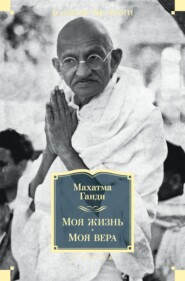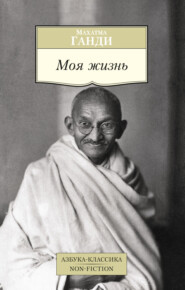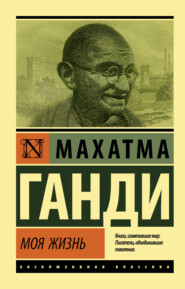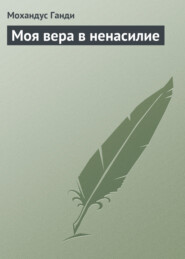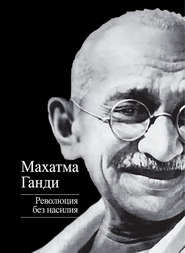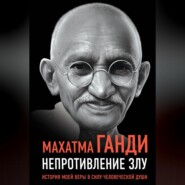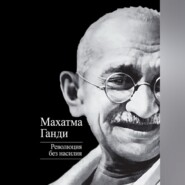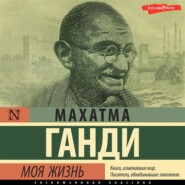По всем вопросам обращайтесь на: info@litportal.ru
(©) 2003-2024.
✖
The Story of My Life / История моей жизни
Настройки чтения
Размер шрифта
Высота строк
Поля
A wave of 'reform' was sweeping over Rajkot at the time when I first came across this friend. He informed me that many of our teachers were secretly taking meat and wine. He also named many well-known people of Rajkot as belonging to the same company. There were also, I was told, some highschool boys among them.
I was surprised and pained. I asked my friend the reason and he explained it thus: “We are a weak people because we do not eat meat. The English are able to rule over us, because they are meat-eaters. You know how hardy I am, and how great a runner too. It is because I am meat-eater. Meat-eaters eaters do not have boils, and even if they sometimes happen to have any, these heal quickly. Our teachers and other distinguished people who eat meat are no fools. They know its virtues. You should do likewise. There is nothing like trying. Try, and see what strength it gives.”
All these pleas on behalf of meat-eating were not made at a single sitting. They represent the substance of a long and elaborate argument which my friend was trying to impress upon me from time to time. My elder brother had already fallen. He therefore supported my friend's argument. I certainly looked feeble-bodied by the side of my brother and this friend. They were both hardier, physically stronger, and more daring. This friend's exploits cast a spell over me. He could run long distances and extraordinarily fast. He was an adept in high and long jumping. He could put up with any amount of physical punishment. He would often display his exploits to me and, as one is always dazzled when he sees in others the qualities that he lacks himself, I was dazzled by this friend's exploits. This was followed by a strong desire to be like him. I could hardly jump or run. Why should not I also be as strong as he?
Moreover, I was a coward. I used to be afraid of thieves, ghosts and serpents. I did not dare to stir out of doors at night. Darkness was a terror to me. It was almost impossible for me to sleep in the dark, as I would imagine ghosts coming from one direction, thieves from another and serpents from a third. I could not therefore bear to sleep without a light in the room. My friend knew all these weaknesses of mine. He would tell me that he could hold in his hand live serpents, could defy thieves and did not believe in ghosts.
All these had its due effect on me. I was beaten. It began to grow on me that meat-eating was good, that it would make me strong and daring, and that, if the whole country took to meat-eating, the English could be overcome.
A day was thereupon fixed for beginning the experiment. It had to be done in secret as my parents were orthodox Vaishnavas, and I was extremely devoted to them. I cannot say that I did not know then that I should have to deceive my parents if I began eating meat. But my mind was bent on the 'reform'. It was not a question of having something tasty to eat. I did not know that it had a particularly good taste. I wished to be strong and daring and wanted my countrymen also to be such. The zeal for the 'reform' blinded me. And having ensured secrecy, I persuaded myself that mere hiding the deed from parents was no departure from truth.
So the day came. We went in search of a lonely spot by the river, and there I saw, for the first time in my life, meat. There was baker's bread also. I did not like either. The goat's meat was as tough as leather. I simply could not eat it. I was sick and had to leave off eating.
I had a very bad night afterwards. A horrible dream haunted me. Every time I dropped off to sleep it would seem as though a live goat were crying inside me, and I would jump up sorry for what I had done. But then I would remind myself that meat-eating was a duty and so become more cheerful.
My friend was not a man to give in easily. He now began to cook various delicacies with meat. And for dining, no longer was the quiet spot on the river chosen, but a State house, with its dining hall and tables and chairs, about which my friend had made arrangements with the chief cook there.
Gradually I got over my dislike for bread, gave up my pity for the goats, and began to enjoy meat-dishes, if not meat itself. This went on for about a year. But not more than half a dozen meat-feasts were enjoyed in all. I had no money to pay for this 'reform'. My friend had therefore always to find the money. I had no knowledge where he found it. But find it he did, because he was bent on turning me into a meat-eater. But even his means must have been limited, and hence these feasts had necessarily to be few and far between.
Whenever I had occasion to indulge in these secret feasts, eating at home was impossible. My mother would naturally ask me to come and take my food and want to know the reason why I did not wish to eat. I would say to her, “I have no appetite today; there is something wrong with my digestion.” I knew I was lying, and lying to my mother. I also knew that, if my mother and father came to know of my having become a meat-eater, they would be deeply shocked. This knowledge was making me feel uneasy.
Therefore I said to myself: “Though it is essential to eat meat, and also essential to take up food 'reform' in the country, yet deceiving and lying to one's father and mother is worse than not eating meat. In their lifetime, therefore, meat-eating must be given up. When they are no more and I have found my freedom, I will eat meat openly, but until that moment arrives I will keep away from it.”
This decision I told to my friend, and I have never since gone back to meat.
5. Stealing
I have still to relate some of my failings during this meat-eating period and also previous to it, which date from before my marriage or soon after.
A relative and I became fond of smoking. Not that we saw any good in smoking, or liked the smell of a cigarette. We simply imagined a sort of pleasure in sending out clouds of smoke from our mouths. My uncle had the habit, and we should copy his example. But we had no money. So we began stealing stumps of cigarettes thrown away by my uncle.
The stumps, however, were not always available, and could not give out much smoke either. So we began to steal coppers from the servant's pocket-money in order to purchase Indian cigarettes. But the question was where to keep them. We could not of course smoke in the presence of elders. We managed somehow for a few weeks on these stolen coppers. In the meantime we heard that the stalks of a certain plant could be smoked like cigarettes. We got them and began this kind of smoking.
But we were far from being satisfied with such things as these. Our want of independence began to be painful. It was unbearable that we should be unable to do anything without the elders' permission. At last, in sheer disgust, we decided to commit suicide!
But how were we to do it? From where were we to get the poison? We heard that dhatura seeds were an effective poison. Off we went to the jungle in search of these seeds and got them. Evening was thought to be the auspicious hour. We went to Kedarji Mandir, put ghee in the temple-lamp, had the darshan and then looked for a lonely corner. But our courage failed us. Supposing we were not at once killed? And what was the good of killing ourselves? Why not rather put up with the lack of independence? But we swallowed two or three seeds nevertheless. We dared not take more. Both of us did not like to die, and decided to go to Ramji Mandir to calm ourselves, and to dismiss the thought of suicide.
I realized that it was not easy to commit suicide.
The thought of suicide ultimately resulted in both of us bidding goodbye to the habit of smoking and of stealing the servant's coppers for the purpose.
Ever since I have grown up, I have never desired to smoke and have always regarded the habit of smoking as barbarous, dirty and harmful. I have never understood why there is such a desire for smoking throughout the world. I cannot bear to travel in a compartment full of people smoking. I become choked.
But much more serious than this theft was the one I was guilty of a little later. I stole the coppers when I was twelve or thirteen, possibly less. The other theft was committed when I was fifteen. In this case I stole a bit of gold out of my meat-eating brother's armlet. This brother had run into a debt of about twenty-five rupees. He had on his arm an armlet of solid gold. It was not difficult to clip a bit out of it.
Well, it was done, and the debt cleared. But this became more than I could bear. I resolved never to steal again. I also made up my mind to confess it to my father. But I did not dare to speak. Not that I was afraid of my father beating me. No. I do not recall his ever having beaten any of us. I was afraid of the pain that I should cause him. But I felt that the risk should be taken; that there could not be cleansing without a clean confession.
I decided at last to write out the confession to submit it to my father, and ask his forgiveness. I wrote it on a slip of paper and handed it to him myself. In this note not only did I confess my guilt, but I asked adequate punishment for it, and closed with a request to him not to punish himself for my offence. I also pledged myself never to steal in future.
I was trembling as I handed the confession to my father. He was then confined to bed. His bed was a plain wooden plank. I handed him the note and sat opposite the plank.
He read it through, and tears trickled down his cheeks, wetting the paper. For a moment he closed his eyes in thought and then tore up the note. He had sat up to read it. He again lay down. I also cried. I could see my father's agony. If I were a painter I could draw a picture of the whole scene today. It is still so vivid in my mind.
Those tears of love cleansed my heart, and washed my sin away. Only he who has experienced such love can know what it is.
This sort of forgiveness was not natural to my father. I had thought that he would be angry, say hard things, and strike his forehead. But he was so wonderfully peaceful, and I believe this was due to my clean confession. A clean confession, combined with a promise never to commit the sin again, when offered before one who has the right to receive it, is the purest type of repentance. I know that my confession made my father feel absolutely safe about me, and increased greatly his affection for me.
6. My Father's Illness & Death
The time of which I am now speaking is my sixteenth year. My father, as we have seen, was bedridden. My mother, an old servant of the house, and I were attending on him. I had the duties of a nurse, which mainly consisted in dressing the wound, and giving my father his medicine. Every night I massaged his legs and retired only when he asked me to do so or after he had fallen asleep. I loved to do this service. I do not remember ever having neglected it. All the time at my disposal, after the performance of the daily duties, was divided between school and attending on my father. I would only go out for an evening walk either when he permitted me or when he was feeling well.
The dreadful night came. It was 10.30 or 11 p.m. I was giving the massage. My uncle offered to relieve me. I was glad and went straight to bed. In five or six minutes, however, the servant knocked at the door. I started with alarm. “Get up,” he said. “Father is very ill.” I knew of course that he was very ill, and so I guessed what 'very ill' meant that moment. I sprang out of bed.
“What is the matter? Do tell me!”
“Father is no more.”
So all was over! I felt very unhappy that I was not near my father when he died.
7. Glimpses of Religion
I have said before that there was in me a fear of ghosts and spirits. Rambha, my nurse, suggested, as a remedy for this fear, the repetition of Ramanama or name of God. I had more faith in her than in her remedy, and so at a very early age began repeating Ramanama to cure my fear of ghosts and spirits. This was of course short-lived, but the good seed sown in childhood was not sown in vain. I think it is due to the seed sown by that good woman Rambha that today Ramanama is a never failing remedy for me.
During part of his illness my father was in Porbandar. There every evening he used to listen to the Ramayana. The reader was a great devotee of Rama. He had a good voice. He would sing the verses and explain them, losing himself in the story and carrying his listeners along with him. I must have been thirteen at that time, but I quite remember being quite taken up by his reading. That laid the foundation of my deep devotion to the Ramayana. Today I regard the Ramayana of Tulsidas as the greatest book in all religious literature.
In Rajkot I learnt to be friendly to all branches of Hinduism and sister religions. For my father and mother would visit the Haveli as also Shiva's and Rama's temples, and would take or send us youngsters there. Jain monks also would pay frequent visits to my father, and would even go out of their way to accept food from us – non-Jains. They would have talks with my father on subjects religious and worldly.
He had besides, Mussalman and Parsi friends, who would talk to him about their own faiths, and he would listen to them always with respect, and often with interest. Being his nurse, I often had a chance to be present at these talks. These many things combined to teach me toleration for all faiths.
Only Christianity was at the time an exception. I developed a sort of dislike for it. And for a reason. In those days Christian missionaries used to stand in a corner near the high school and preach against Hindus and their gods. I could not endure this. About the same time, I heard of a well-known Hindu having been converted to Christianity. It was the talk of the town that when he was baptized, he had to eat beef and drink liquor, that he also had to change his clothes, and that from then on he began to go about in European costume including a hat. I also heard that the new convert had already begun abusing the religion of his ancestors, their customs and their country. All these things made me dislike Christianity.
But the fact that I had learnt to be tolerant to other religions did not mean that I had any living faith in God. But one thing took deep root in me – the conviction that morality is the basis of things and that truth is the substance of all morality.
A Gujarati verse likewise gripped my mind and heart. Its teaching – return good for evil – became my guiding principle. It became such a passion with me that I began numerous experiments in it. Here are those (for me) wonderful lines:
For a bowl of water give a goodly meal;
For a kindly greeting bow thou down with zeal;
For a simple penny pay thou back with gold;
If thy life be rescued, life do not withhold.
Thus the words and actions of the wise regard;
Every little service tenfold they reward.
But the truly noble know all men as one
And return with gladness good for evil done.
8. Preparation for England
My elders wanted me to continue my studies at college after school. There was a college in Bhavnagar as well as in Bombay, and as the former was cheaper, I decided to go there and join the Samaldas College. I went, but found everything very difficult. At the end of the first term, I returned home.
We had in Mavji Dave, who was a shrewd and learned Brahman, an old friend and adviser of the family. He had kept up his connection with the family even after my father's death. He happened to visit us during my holidays.
I was surprised and pained. I asked my friend the reason and he explained it thus: “We are a weak people because we do not eat meat. The English are able to rule over us, because they are meat-eaters. You know how hardy I am, and how great a runner too. It is because I am meat-eater. Meat-eaters eaters do not have boils, and even if they sometimes happen to have any, these heal quickly. Our teachers and other distinguished people who eat meat are no fools. They know its virtues. You should do likewise. There is nothing like trying. Try, and see what strength it gives.”
All these pleas on behalf of meat-eating were not made at a single sitting. They represent the substance of a long and elaborate argument which my friend was trying to impress upon me from time to time. My elder brother had already fallen. He therefore supported my friend's argument. I certainly looked feeble-bodied by the side of my brother and this friend. They were both hardier, physically stronger, and more daring. This friend's exploits cast a spell over me. He could run long distances and extraordinarily fast. He was an adept in high and long jumping. He could put up with any amount of physical punishment. He would often display his exploits to me and, as one is always dazzled when he sees in others the qualities that he lacks himself, I was dazzled by this friend's exploits. This was followed by a strong desire to be like him. I could hardly jump or run. Why should not I also be as strong as he?
Moreover, I was a coward. I used to be afraid of thieves, ghosts and serpents. I did not dare to stir out of doors at night. Darkness was a terror to me. It was almost impossible for me to sleep in the dark, as I would imagine ghosts coming from one direction, thieves from another and serpents from a third. I could not therefore bear to sleep without a light in the room. My friend knew all these weaknesses of mine. He would tell me that he could hold in his hand live serpents, could defy thieves and did not believe in ghosts.
All these had its due effect on me. I was beaten. It began to grow on me that meat-eating was good, that it would make me strong and daring, and that, if the whole country took to meat-eating, the English could be overcome.
A day was thereupon fixed for beginning the experiment. It had to be done in secret as my parents were orthodox Vaishnavas, and I was extremely devoted to them. I cannot say that I did not know then that I should have to deceive my parents if I began eating meat. But my mind was bent on the 'reform'. It was not a question of having something tasty to eat. I did not know that it had a particularly good taste. I wished to be strong and daring and wanted my countrymen also to be such. The zeal for the 'reform' blinded me. And having ensured secrecy, I persuaded myself that mere hiding the deed from parents was no departure from truth.
So the day came. We went in search of a lonely spot by the river, and there I saw, for the first time in my life, meat. There was baker's bread also. I did not like either. The goat's meat was as tough as leather. I simply could not eat it. I was sick and had to leave off eating.
I had a very bad night afterwards. A horrible dream haunted me. Every time I dropped off to sleep it would seem as though a live goat were crying inside me, and I would jump up sorry for what I had done. But then I would remind myself that meat-eating was a duty and so become more cheerful.
My friend was not a man to give in easily. He now began to cook various delicacies with meat. And for dining, no longer was the quiet spot on the river chosen, but a State house, with its dining hall and tables and chairs, about which my friend had made arrangements with the chief cook there.
Gradually I got over my dislike for bread, gave up my pity for the goats, and began to enjoy meat-dishes, if not meat itself. This went on for about a year. But not more than half a dozen meat-feasts were enjoyed in all. I had no money to pay for this 'reform'. My friend had therefore always to find the money. I had no knowledge where he found it. But find it he did, because he was bent on turning me into a meat-eater. But even his means must have been limited, and hence these feasts had necessarily to be few and far between.
Whenever I had occasion to indulge in these secret feasts, eating at home was impossible. My mother would naturally ask me to come and take my food and want to know the reason why I did not wish to eat. I would say to her, “I have no appetite today; there is something wrong with my digestion.” I knew I was lying, and lying to my mother. I also knew that, if my mother and father came to know of my having become a meat-eater, they would be deeply shocked. This knowledge was making me feel uneasy.
Therefore I said to myself: “Though it is essential to eat meat, and also essential to take up food 'reform' in the country, yet deceiving and lying to one's father and mother is worse than not eating meat. In their lifetime, therefore, meat-eating must be given up. When they are no more and I have found my freedom, I will eat meat openly, but until that moment arrives I will keep away from it.”
This decision I told to my friend, and I have never since gone back to meat.
5. Stealing
I have still to relate some of my failings during this meat-eating period and also previous to it, which date from before my marriage or soon after.
A relative and I became fond of smoking. Not that we saw any good in smoking, or liked the smell of a cigarette. We simply imagined a sort of pleasure in sending out clouds of smoke from our mouths. My uncle had the habit, and we should copy his example. But we had no money. So we began stealing stumps of cigarettes thrown away by my uncle.
The stumps, however, were not always available, and could not give out much smoke either. So we began to steal coppers from the servant's pocket-money in order to purchase Indian cigarettes. But the question was where to keep them. We could not of course smoke in the presence of elders. We managed somehow for a few weeks on these stolen coppers. In the meantime we heard that the stalks of a certain plant could be smoked like cigarettes. We got them and began this kind of smoking.
But we were far from being satisfied with such things as these. Our want of independence began to be painful. It was unbearable that we should be unable to do anything without the elders' permission. At last, in sheer disgust, we decided to commit suicide!
But how were we to do it? From where were we to get the poison? We heard that dhatura seeds were an effective poison. Off we went to the jungle in search of these seeds and got them. Evening was thought to be the auspicious hour. We went to Kedarji Mandir, put ghee in the temple-lamp, had the darshan and then looked for a lonely corner. But our courage failed us. Supposing we were not at once killed? And what was the good of killing ourselves? Why not rather put up with the lack of independence? But we swallowed two or three seeds nevertheless. We dared not take more. Both of us did not like to die, and decided to go to Ramji Mandir to calm ourselves, and to dismiss the thought of suicide.
I realized that it was not easy to commit suicide.
The thought of suicide ultimately resulted in both of us bidding goodbye to the habit of smoking and of stealing the servant's coppers for the purpose.
Ever since I have grown up, I have never desired to smoke and have always regarded the habit of smoking as barbarous, dirty and harmful. I have never understood why there is such a desire for smoking throughout the world. I cannot bear to travel in a compartment full of people smoking. I become choked.
But much more serious than this theft was the one I was guilty of a little later. I stole the coppers when I was twelve or thirteen, possibly less. The other theft was committed when I was fifteen. In this case I stole a bit of gold out of my meat-eating brother's armlet. This brother had run into a debt of about twenty-five rupees. He had on his arm an armlet of solid gold. It was not difficult to clip a bit out of it.
Well, it was done, and the debt cleared. But this became more than I could bear. I resolved never to steal again. I also made up my mind to confess it to my father. But I did not dare to speak. Not that I was afraid of my father beating me. No. I do not recall his ever having beaten any of us. I was afraid of the pain that I should cause him. But I felt that the risk should be taken; that there could not be cleansing without a clean confession.
I decided at last to write out the confession to submit it to my father, and ask his forgiveness. I wrote it on a slip of paper and handed it to him myself. In this note not only did I confess my guilt, but I asked adequate punishment for it, and closed with a request to him not to punish himself for my offence. I also pledged myself never to steal in future.
I was trembling as I handed the confession to my father. He was then confined to bed. His bed was a plain wooden plank. I handed him the note and sat opposite the plank.
He read it through, and tears trickled down his cheeks, wetting the paper. For a moment he closed his eyes in thought and then tore up the note. He had sat up to read it. He again lay down. I also cried. I could see my father's agony. If I were a painter I could draw a picture of the whole scene today. It is still so vivid in my mind.
Those tears of love cleansed my heart, and washed my sin away. Only he who has experienced such love can know what it is.
This sort of forgiveness was not natural to my father. I had thought that he would be angry, say hard things, and strike his forehead. But he was so wonderfully peaceful, and I believe this was due to my clean confession. A clean confession, combined with a promise never to commit the sin again, when offered before one who has the right to receive it, is the purest type of repentance. I know that my confession made my father feel absolutely safe about me, and increased greatly his affection for me.
6. My Father's Illness & Death
The time of which I am now speaking is my sixteenth year. My father, as we have seen, was bedridden. My mother, an old servant of the house, and I were attending on him. I had the duties of a nurse, which mainly consisted in dressing the wound, and giving my father his medicine. Every night I massaged his legs and retired only when he asked me to do so or after he had fallen asleep. I loved to do this service. I do not remember ever having neglected it. All the time at my disposal, after the performance of the daily duties, was divided between school and attending on my father. I would only go out for an evening walk either when he permitted me or when he was feeling well.
The dreadful night came. It was 10.30 or 11 p.m. I was giving the massage. My uncle offered to relieve me. I was glad and went straight to bed. In five or six minutes, however, the servant knocked at the door. I started with alarm. “Get up,” he said. “Father is very ill.” I knew of course that he was very ill, and so I guessed what 'very ill' meant that moment. I sprang out of bed.
“What is the matter? Do tell me!”
“Father is no more.”
So all was over! I felt very unhappy that I was not near my father when he died.
7. Glimpses of Religion
I have said before that there was in me a fear of ghosts and spirits. Rambha, my nurse, suggested, as a remedy for this fear, the repetition of Ramanama or name of God. I had more faith in her than in her remedy, and so at a very early age began repeating Ramanama to cure my fear of ghosts and spirits. This was of course short-lived, but the good seed sown in childhood was not sown in vain. I think it is due to the seed sown by that good woman Rambha that today Ramanama is a never failing remedy for me.
During part of his illness my father was in Porbandar. There every evening he used to listen to the Ramayana. The reader was a great devotee of Rama. He had a good voice. He would sing the verses and explain them, losing himself in the story and carrying his listeners along with him. I must have been thirteen at that time, but I quite remember being quite taken up by his reading. That laid the foundation of my deep devotion to the Ramayana. Today I regard the Ramayana of Tulsidas as the greatest book in all religious literature.
In Rajkot I learnt to be friendly to all branches of Hinduism and sister religions. For my father and mother would visit the Haveli as also Shiva's and Rama's temples, and would take or send us youngsters there. Jain monks also would pay frequent visits to my father, and would even go out of their way to accept food from us – non-Jains. They would have talks with my father on subjects religious and worldly.
He had besides, Mussalman and Parsi friends, who would talk to him about their own faiths, and he would listen to them always with respect, and often with interest. Being his nurse, I often had a chance to be present at these talks. These many things combined to teach me toleration for all faiths.
Only Christianity was at the time an exception. I developed a sort of dislike for it. And for a reason. In those days Christian missionaries used to stand in a corner near the high school and preach against Hindus and their gods. I could not endure this. About the same time, I heard of a well-known Hindu having been converted to Christianity. It was the talk of the town that when he was baptized, he had to eat beef and drink liquor, that he also had to change his clothes, and that from then on he began to go about in European costume including a hat. I also heard that the new convert had already begun abusing the religion of his ancestors, their customs and their country. All these things made me dislike Christianity.
But the fact that I had learnt to be tolerant to other religions did not mean that I had any living faith in God. But one thing took deep root in me – the conviction that morality is the basis of things and that truth is the substance of all morality.
A Gujarati verse likewise gripped my mind and heart. Its teaching – return good for evil – became my guiding principle. It became such a passion with me that I began numerous experiments in it. Here are those (for me) wonderful lines:
For a bowl of water give a goodly meal;
For a kindly greeting bow thou down with zeal;
For a simple penny pay thou back with gold;
If thy life be rescued, life do not withhold.
Thus the words and actions of the wise regard;
Every little service tenfold they reward.
But the truly noble know all men as one
And return with gladness good for evil done.
8. Preparation for England
My elders wanted me to continue my studies at college after school. There was a college in Bhavnagar as well as in Bombay, and as the former was cheaper, I decided to go there and join the Samaldas College. I went, but found everything very difficult. At the end of the first term, I returned home.
We had in Mavji Dave, who was a shrewd and learned Brahman, an old friend and adviser of the family. He had kept up his connection with the family even after my father's death. He happened to visit us during my holidays.






